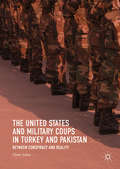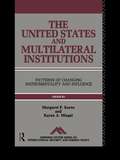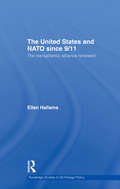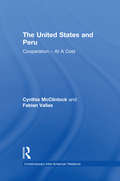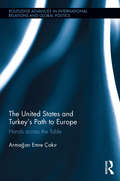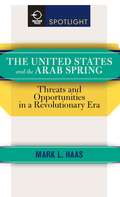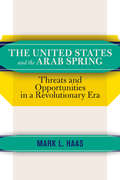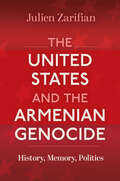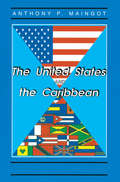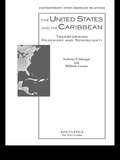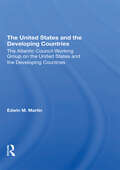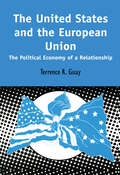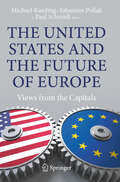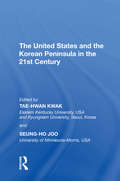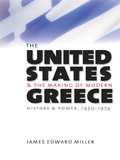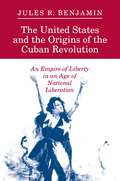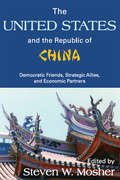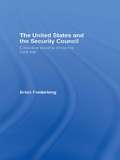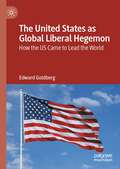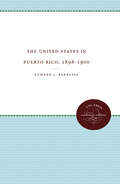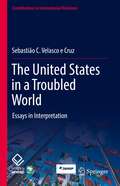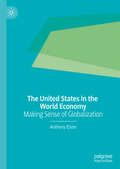- Table View
- List View
The United States and Military Coups in Turkey and Pakistan: Between Conspiracy and Reality
by Ömer AslanThis comparative study explores the involvement of the United States in four successful military coups in Turkey and Pakistan during the Cold War. Focusing on military-to-military relations with the US in each country, the book offers insight into how external actors can impact the outcomes of coups, particularly through socialization via military training, education, and international organizations such as NATO. Drawing upon recently declassified government documents and a trove of unexplored interviews with high-ranking officials, Ömer Aslan also examines how coup plotters in both countries approached the issue of US reaction before, during, and after their coups. As armed forces have continued to make and unmake Turkish and Pakistani governments well into the twenty-first century, this volume offers original, probing analysis of the circumstances which make coups possible.
The United States and Multilateral Institutions: Patterns of Changing Instrumentality and Influence
by Karen A. Mingst Margaret P. KarnsWorld politics in the post-Cold War world has become increasingly institutionalized. However, the role of international organizations has been overlooked in much of the literature on international regimes. Now in paperback, The United States and Multilateral Institutions examines United States policy in areas ranging from international trade to human rights, and in institutions such as the International Monetary Fund (IMF), GATT and the World Health Organization.
The United States and NATO since 9/11: The Transatlantic Alliance Renewed (Routledge Studies in US Foreign Policy)
by Ellen HallamsThe US decision not to work through NATO after 9/11 left many European members of the alliance feeling deflated. This decision reflected not only the unilateralism of the Bush Administration, but also the belief that US operational freedom and flexibility had been hampered during NATO's two Balkans interventions. This book examines US attitudes to, and perspectives on, the transatlantic alliance, with a particular focus on US-NATO relations since 9/11. It demonstrates that, following the decision to bypass NATO after 9/11, the Bush Administration's perceptions of the alliance shifted due to a belated recognition that NATO did indeed have much to offer the US. Hallams explores NATO's contributions to post-combat reconstruction and stabilisation operations in Afghanistan and Iraq, and argues that the events of 9/11 galvanised NATO into undertaking an accelerated program of transformation that has done much to reinvigorate the alliance. This book offers an optimistic assessment of the transatlantic alliance, counter-balanced by realistic reflections on the problems it faces. Drawing on interviews with US and NATO officials, it argues that NATO is far from irrelevant and that prospects for the alliance remain fundamentally positive; it will be of interest to students and scholars of US Foreign Policy, American politics, international relations, security studies and transatlantic studies.
The United States and Peru: Cooperation -- At A Cost
by Cynthia McClintock Fabian VallasThe early 1990s marked a critical turning point in the relationship between the United States and Peru. Prior to the election of Albert Fujimori in 1990, the relationship between governments had been contentious. Fujimori, however, sought to work together with the United States regarding issues such as security threats, free-market reform and narcotics control. Yet even with this new spirit of cooperation, the two governments still clashed over international standards of democracy and human rights at a time when most Latin American countries were much more democratic. This work traces the relationship between the two countries from 1990-2000, examining political and military issues, including drug trafficking, guerrillas, human rights violations and the US role in the 1995 war between Peru and Ecuador.
The United States and Turkey's Path to Europe: Hands across the Table (Routledge Advances in International Relations and Global Politics)
by Armağan Emre ÇakırTurkey’s relations with the European Union is one of the most enigmatic topics in the European Studies literature. This country, kept at bay by Europeans for centuries, once came unexpectedly close to full-membership. The progress Turkey recorded in its European quest is difficult to account for with either Turkey’s performance or the positive attitude of the Europeans towards Turkey. In this book, Armağan Emre Çakır chronicles over six decades of US involvement in EU-Turkey relations. Shedding new light on the reasons, characteristics, transformation and relative importance of the US influence on Turkey-EU relations, he argues that Turkey’s quest for EU membership would not have advanced this far without the support from the United States. Çakır’s hypotheses and findings are grounded in original research that, among other things, includes interviews conducted on both sides of the Atlantic with key players, archival material and newspaper articles. The valuable insights presented in this book make for a much needed alternative history of this volatile relationship.
The United States and the Arab Spring
by Mark L. HaasIn this Westview Press Spotlight, Mark L. Haas explores the major political consequences of the Arab Spring protests in North Africa and the Middle East as well as how and why US leaders responded to these developments. A detailed examination of the threats and opportunities to US interests created by the uprisings are prominent in the analysis of the events. Students will learn about the individual protests and aftermath of the Arab Spring as well as the various policies the United States might adopt to best advance US security in the new international environment. The United States and the Arab Spring is an extracted chapter from the 2013 Updated Edition of The Middle East and the United States, Fifth Edition (ISBN 978-0-8133-4914-5), edited by regional experts David W. Lesch and Mark L. Haas. In the full-length edition of the text, scholars and diplomats from the Middle East, Europe, and North America provide an objective, cross-cultural assessment of U. S. policy toward the Middle East and Middle Eastern political history from the First World War through the present.
The United States and the Arab Spring
by Mark L. HaasIn this Westview Press Spotlight, Mark L. Haas explores the major political consequences of the Arab Spring protests in North Africa and the Middle East as well as how and why US leaders responded to these developments. A detailed examination of the threats and opportunities to US interests created by the uprisings are prominent in the analysis of the events. Students will learn about the individual protests and aftermath of the Arab Spring as well as the various policies the United States might adopt to best advance US security in the new international environment.The United States and the Arab Spring is an extracted chapter from the Updated 2013 Edition of The Middle East and the United States, Fifth Edition (ISBN 978-0-8133-4914-5), edited by regional experts David W. Lesch and Mark L. Haas. In the full-length edition of the text, scholars and diplomats from the Middle East, Europe, and North America provide an objective, cross-cultural assessment of US policy toward the Middle East and Middle Eastern political history from the First World War through the present.
The United States and the Arab Spring: Threats and Opportunities in a Revolutionary Era (Westview Press Spotlight Ser.)
by Mark L. HaasIn this Westview Press Spotlight, Mark L. Haas explores the major political consequences of the Arab Spring protests in North Africa and the Middle East as well as how and why US leaders responded to these developments. A detailed examination of the threats and opportunities to US interests created by the uprisings are prominent in the analysis of the events. Students will learn about the individual protests and aftermath of the Arab Spring as well as the various policies the United States might adopt to best advance US security in the new international environment. The United States and the Arab Spring is an extracted chapter from the 2013 Updated Edition of The Middle East and the United States, Fifth Edition, edited by regional experts David W. Lesch and Mark L. Haas. In the full-length edition of the text, scholars and diplomats from the Middle East, Europe, and North America provide an objective, cross-cultural assessment of U.S. policy toward the Middle East and Middle Eastern political history from the First World War through the present.
The United States and the Armenian Genocide: History, Memory, Politics (Genocide, Political Violence, Human Rights)
by Julien ZarifianDuring the first World War, over a million Armenians were killed as Ottoman Turks embarked on a bloody campaign of ethnic cleansing. Scholars have long described these massacres as genocide, one of Hitler’s prime inspirations for the Holocaust, yet the United States did not officially recognize the Armenian Genocide until 2021. This is the first book to examine how and why the United States refused to acknowledge the Armenian Genocide until the early 2020s. Although the American government expressed sympathy towards the plight of the Armenians in the 1910s and 1920s, historian Julien Zarifian explores how, from the 1960s, a set of geopolitical and institutional factors soon led the United States to adopt a policy of genocide non-recognition which it would cling to for over fifty years, through Republican and Democratic administrations alike. He describes the forces on each side of this issue: activists from the US Armenian diaspora and their allies, challenging Cold War statesmen worried about alienating NATO ally Turkey and dealing with a widespread American reluctance to directly confront the horrors of the past. Drawing from congressional records, rare newspapers, and interviews with lobbyists and decision-makers, he reveals how genocide recognition became such a complex, politically sensitive issue.
The United States and the Caribbean: Challenges of an Asymmetrical Relationship (Warwick University Caribbean Studies)
by Anthony Maingot<p>This book explores the complex interdependence between the small Caribbean states and the United States and looks at their changing relationships throughout history. The main difficulty for the small state is to discern where and when synergies may be found in its relations with more powerful states—in this case, the United States. The need for cooperation among the less powerful states, for sharing interests and values, must be combined with respect on both sides for democratic and human rights. <p>The author traces the history of these relationships from 1823 to the end of the Cold War, then examines the U.S. response to the Marxist challenge. He then turns to an investigation of different aspects of modern Caribbean relations, such as the problems of drug trafficking, offshore interests, and migration. The book concludes with a discussion on the limits to sovereignty and the challenges that have evolved in U.S.-Caribbean studies.
The United States and the Caribbean: Transforming Hegemony and Sovereignty
by Anthony P. Maingot Wilfredo LozanoThis volume provides the first comprehensive assessment of post-Cold War US-Caribbean relations. Focusing on Haiti, the Dominican Republic and Trinidad-Tobago, the book looks at the political history of the region during the Cold War years, the region's current political economy, international security, and issues of migration and crime. Spanning the Caribbean's linguistic and cultural sub regions (Spanish, French, English, and Dutch) it calls attention to the achievements, setbacks, and concerns that are common to the region. The United States and the Caribbean will be of interest to students and scholars of economics, geography and politics and international relations in general.
The United States and the Developing Countries
by Edwin M. MartinFirst Published in 1977. Part of The Atlantic Council Policy Series. It is customary for policy papers produced by the Atlantic Council Working Groups to direct attention primarily to issues that confront the countries of Western Europe, North America, Japan, Australia, and New Zealand. This policy paper has a somewhat different emphasis, dealing primarily with the issues of development policy facing the United States.
The United States and the European Union: The Political Economy of A Relationship (Contemporary European Studies Ser. #Vol. 8)
by Terrence R. GuayFirst Published in 2001. Routledge is an imprint of Taylor & Francis, an informa company.
The United States and the Future of Europe: Views from the Capitals
by Michael Kaeding Paul Schmidt Johannes PollakThis book collects 41 national views from EU Member States and neighbouring countries regarding their respective relationship with the United States. It gives evidence of the importance and diversity of transatlantic relations, assesses the potentially disruptive impact of a second Trump presidency and offers policy recommendations. They range from more strategic autonomy and investments in Europe’s security architecture and industrial infrastructure to careful crafting of EU relations with China, deeper cooperation in tech and climate policies, as well as NATO enlargement. While the Trump administration will likely defend its interests and a preference for ‘divide and conquer’, the decades-old call for Europe to speak with one voice vis-à-vis the U.S. is louder than ever. Nonetheless, numerous countries still seem to favour ‘special’ bilateral ties to the U.S. The book explores the ebbs and flows of transatlantic relationships and carefully speculates about the next four years.
The United States and the Korean Peninsula in the 21st Century
by Tae-Hwan KwakIn the post-Cold War era, US relations with the two Korean states - the Republic of Korea (ROK) and the Democratic People's Republic of Korea (DPRK) - have been undergoing profound changes, with critical and immediate repercussions for peace and security in the Korean Peninsula and Northeast Asia. This volume examines the key political, security and economic aspects of US-ROK and US-DPRK relations, focusing on the current status, salient issues and future prospects. Drs Kwak and Joo are distinguished professionals in the field and their volume constitutes a very interesting addition to the available literature.
The United States and the Making of Modern Greece: History and Power, 1950-1974
by James Edward MillerFocusing on one of the most dramatic and controversial periods in modern Greek history and in the history of the Cold War, James Edward Miller provides the first study to employ a wide range of international archives--American, Greek, English, and French--together with foreign language publications to shed light on the role the United States played in Greece between the termination of its civil war in 1949 and Turkey's 1974 invasion of Cyprus. Miller demonstrates how U. S. officials sought, over a period of twenty-five years, to cultivate Greece as a strategic Cold War ally in order to check the spread of Soviet influence. The United States supported Greece's government through large-scale military aid, major investment of capital, and intermittent efforts to reform the political system. Miller examines the ways in which American and Greek officials cooperated in--and struggled over--the political future and the modernization of the country. Throughout, he evaluates the actions of the key figures involved, from George Papandreou and his son Andreas, to King Constantine, and from John Foster Dulles and Dwight D. Eisenhower to Richard Nixon and Henry Kissinger. Miller's engaging study offers a nuanced and well-balanced assessment of events that still influence Mediterranean politics today.
The United States and the Origins of the Cold War: 1941-1947
by John Lewis GaddisHistory of the period with emphasis on International activity.
The United States and the Origins of the Cuban Revolution: An Empire of Liberty in an Age of National Liberation
by Jules R. BenjaminJules Benjamin argues convincingly that modern conflicts between Cuba and the United States stem from a long history of U.S. hegemony and Cuban resistance. He shows what difficulties the smaller country encountered because of U.S. efforts first to make it part of an "empire of liberty" and later to dominate it by economic methods, and he analyzes the kind of misreading of ardent nationalism that continues to plague U.S. policymaking.
The United States and the Republic of China: Democratic Friends, Strategic Allies and Economic Partners
by Steven W. MosherIn the interest of mutual security, the United States and the Republic of China have continued to cooperate closely. Both countries have kept Taiwan's military defenses strong and ensured stability in the entire region. This volume considers the international status of the Republic of China and its economic and strategic partnership with the United States.
The United States and the Security Council: Collective Security since the Cold War
by Brian FrederkingThis book describes the rules governing international security decision-making and examines the different understandings of collective security in the post-Cold War world. The post-Cold War world has largely been a struggle over which rules govern global security. Discussions and decisions following the events of 9/11 have highlighted differences and disputes in the United Nations Security Council. Where Russia, China, and France prefer ‘procedural’ collective security, in which all enforcement attempts must be explicitly authorized by the Security Council, the US and Britain prefer ‘substantive’ collective security, in which particular countries can sometimes take it upon themselves to enforce the rules of the global community. Using a constructivist theory of global security to analyze a series of case studies on Iraq (1990-91); Somalia, Rwanda, and Haiti; Bosnia and Kosovo; Afghanistan and Iraq (2003), the author demonstrates how competing interpretations of collective security recur. Challenging the claim that 9/11 fundamentally changed world politics, Brian Frederking argues that the events exacerbated already existing tensions between the veto powers of the UN Security Council. The United States and the Security Council will be of interest to students and researchers of American foreign policy, security studies and international organizations.
The United States as Global Liberal Hegemon: How the US Came to Lead the World
by Edward GoldbergThe United States as Global Liberal Hegemon examines America’s role as the global liberal hegemon. Using a historical analysis to understand how the United States came to serve as the world leader, Goldberg argues why the role of a liberal hegemon is needed, whether the United States has the ability to fulfill this role, and what the pitfalls and liabilities of continuing in this role are for the nation. He also considers the impact that this role on the global stage has for the country as well as individual citizens of the United States. Goldberg argues that the United States's geographic location away from strong competitors, it's role as the dominant economy for much of the 20th century, and its political culture of meritocracy all contributed to the United States taking this role in the 1940s. He also argues that the role of liberal hegemon has shifted to include not only being the international policeperson but also to be the world's central banker, a role that at this time only the Unites States can fill.
The United States in Puerto Rico, 1898-1900
by Edward J. BerbusseThrough a close examination of the United States military governments established in Puerto Rico, and with careful attention to the important Foraker Act of 1900, the author presents in detail the results of Puerto Rico's transition from the old world to the new.Originally published in 1966.A UNC Press Enduring Edition -- UNC Press Enduring Editions use the latest in digital technology to make available again books from our distinguished backlist that were previously out of print. These editions are published unaltered from the original, and are presented in affordable paperback formats, bringing readers both historical and cultural value.
The United States in a Troubled World: Essays in Interpretation (Contributions to International Relations)
by Sebastião C. Velasco e CruzThis book presents an overview of the main changes in the United States' foreign policy in response to the transformations in the international order in the last decades. If, after the end of the Cold War, the USA invested in the universalization of market economy and in the strengthening of its military supremacy, new developments demanded reorientations in the country’s foreign strategy. The controversial military interventions in Afghanistan and Iraq, the 2008 economic crisis, the rise of the BRICs (Brazil, Russia, India and China) and the rise of right-wing populism altered the global political landscape and demanded new responses from the most powerful country in the world. This volume brings together nine essays in which the founding member of the World International Studies Committee, Sebastião C. Velasco e Cruz, analyzes how the United States’ foreign policy responded to the growing challenges posed by this changing international order, discussing topics such as: The evolution of the American geopolitical strategy after the end of the Cold War How US foreign policy reacted to challenges to security and dilemmas of the international orderBarack Obama's foreign policy and world politicsDonald Trump and the rise of populism in the USA US relations with BRICs and Latin America The United States in a Troubled World: Essays on Interpretation will be of interest to international relations and political science researchers both within and outside the United States.
The United States in a Warming World
by Thomas L. BrewerAddressing the widespread desire to better understand how climate change issues are addressed in the United States, this book provides an unparalleled analysis of features of the US economic and political system that are essential to understanding its responses to climate change. The introductory chapter presents a firm historical context, with the remainder of the book offering balanced and factual discussions of government, business and public responses to issues of energy policies, congressional activity on climate change, and US government involvement in international conferences. Abundant statistical evidence illustrates key concepts and supports analytic themes such as market failures, free riders, and the benefits and costs of alternative courses of action among industry sectors and geographic areas within the US. Written for audiences both outside and within the US, this accessible book is essential reading for anyone interested in climate change, energy, sustainable development or related issues around the world.
The United States in the World Economy: Making Sense of Globalization
by Anthony ElsonThis book assesses the impact of globalization on the US economy from the perspective of international trade, finance, and immigration, with a view to eliminating misinformation in the current public debate about the costs and benefits of globalization. The United States has played a key role in the development of economic and financial globalization since the end of World War II and has been the largest force for integration of the global economy. While the US economy as a whole has been a net beneficiary from globalization, significant costs have been incurred by certain groups and communities as a result of its effects. This book evaluates the benefits, costs, and impact on income distribution for the United States in the areas of international trade, finance, and immigration, drawing on key findings of the relevant literature. A key argument of this book is that the US economy has been a significant net beneficiary from globalization, but that the government needs to do more for those workers negatively impacted by its effects. This book ends by proposing key institutional reforms at the national and international level that would foster further gains from globalization and create a more equal distribution of its benefits.
